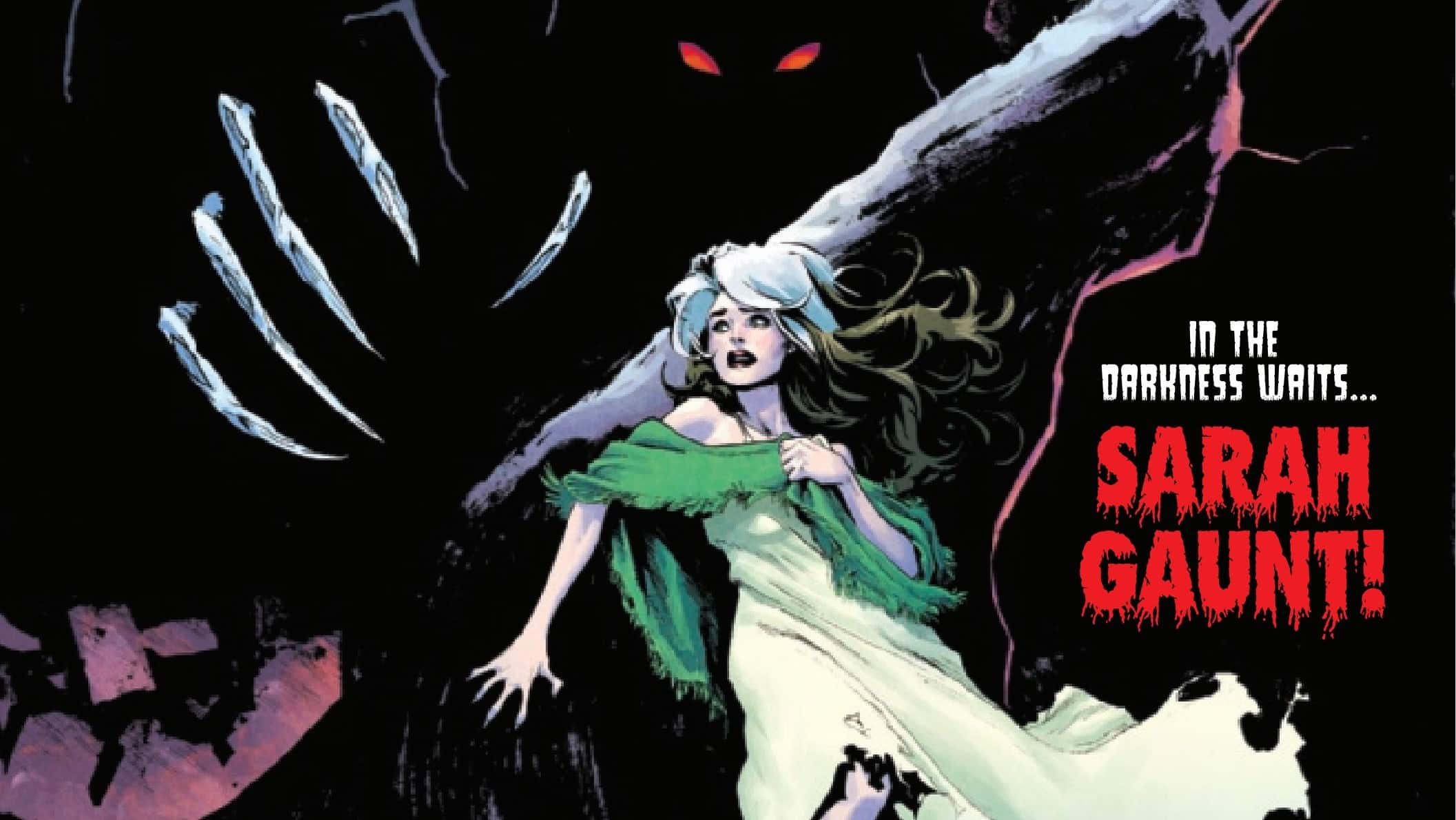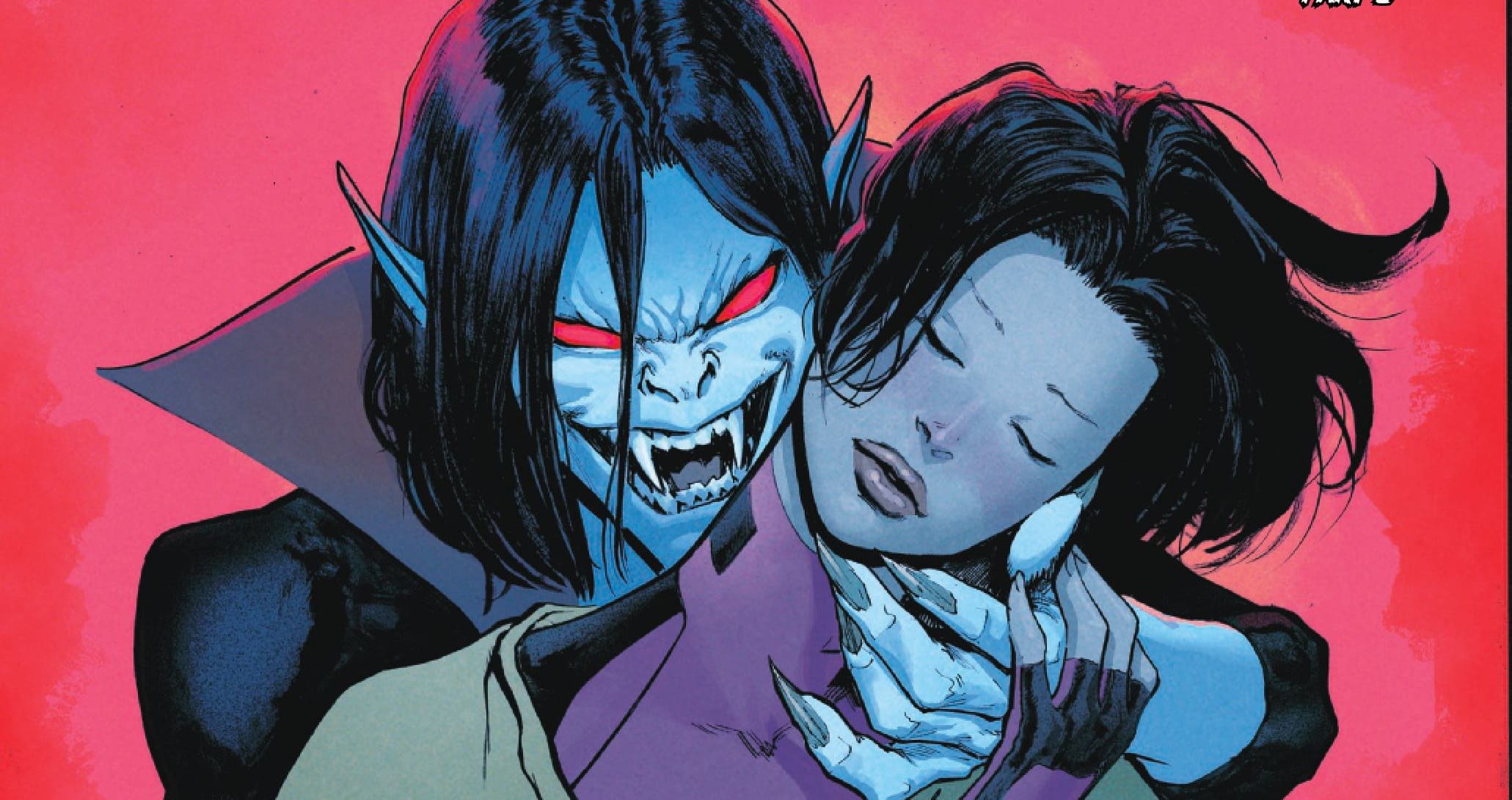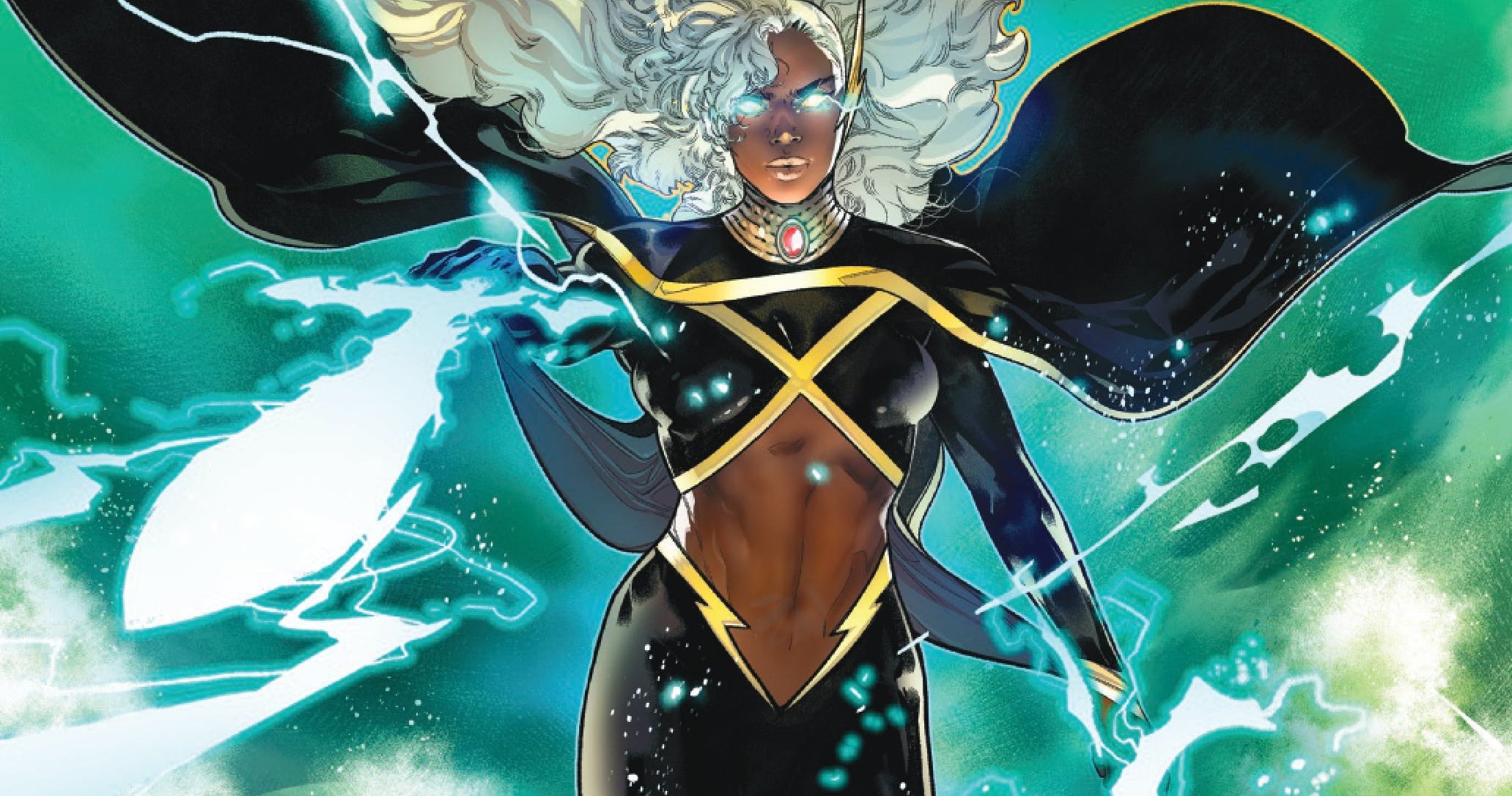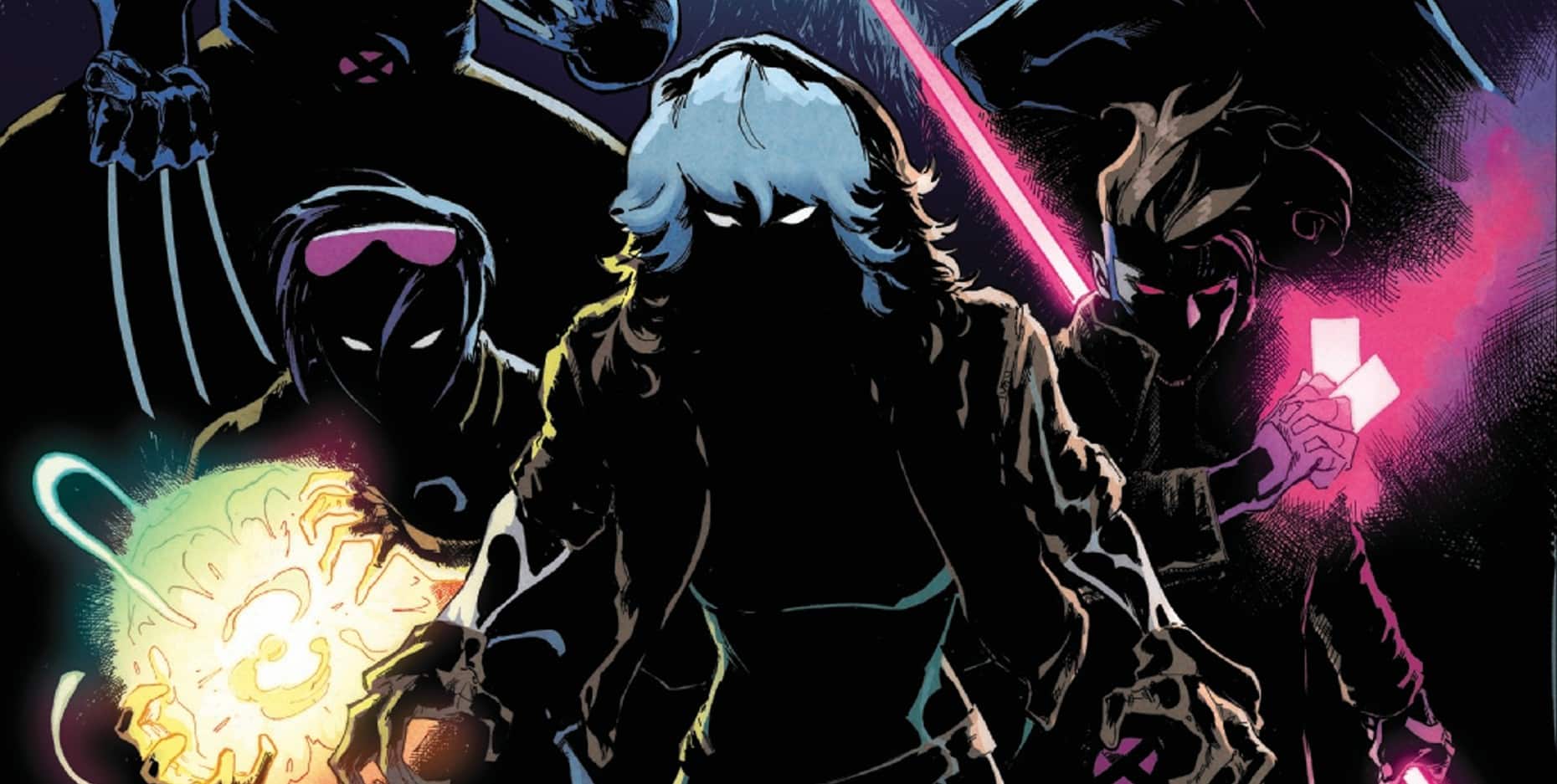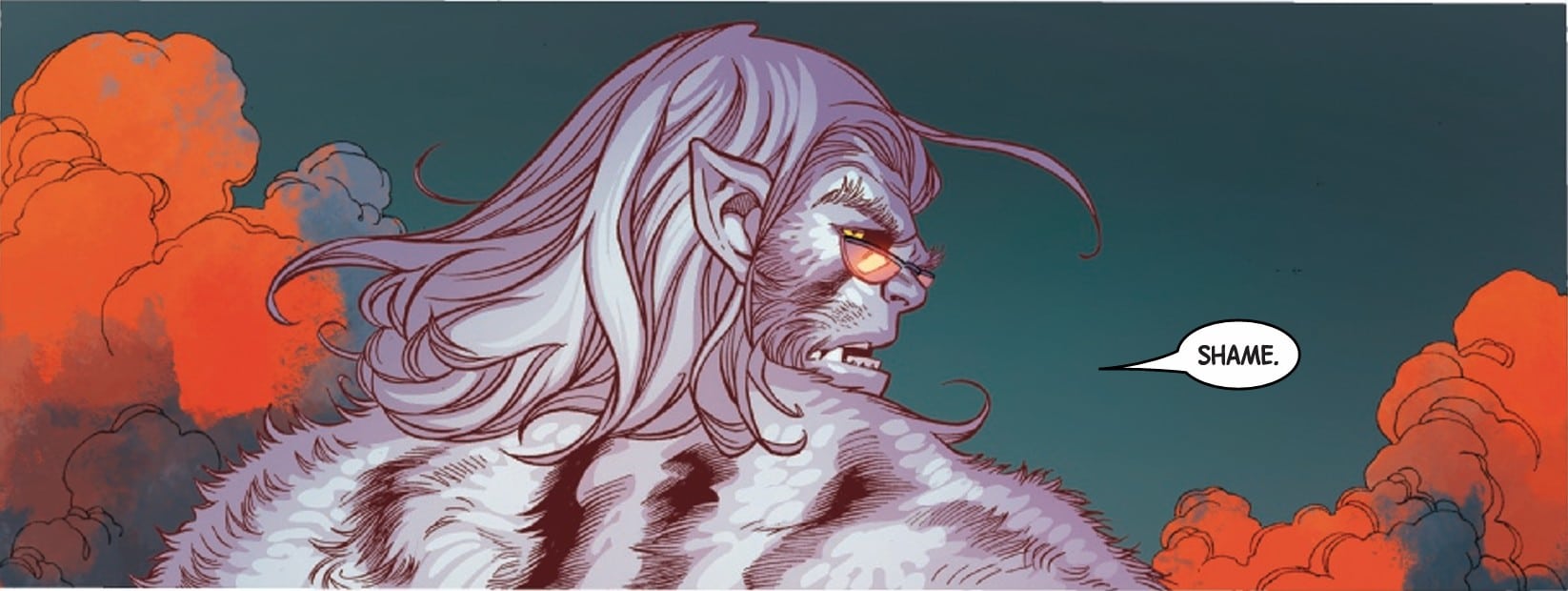With one X-man down and hell coming for the rest, Rogue finds herself alone against a power of darkness for which she is completely unprepared. No backup, no lifeline and no way out. Uncanny X-Men #4 is written by Gail Simone, drawn by David Marquez, colored by Matt Wilson and lettered by Clayton Cowles.
Jake: Well, here we are again for another Uncanny X-Men review, Anna. These issues are coming out so fast I’m not even sure whether to count them in numbers or letters. Fortunately for me, I’ve still got a li’l mess o’ Captain Marvel hidden on the back shelf which should see me through.
Anna: I was excited to spend more time getting to know the Outliers this week, after their strong buildup in the last issue. So it’s cool that they barely took a line in this one. I’m sure we’ll see more from them in future issues. But whether we’re talking about roller coasters or X-Men comics, while some momentum shifts are exhilarating, others leave you regretting the price of admission.
Jake: To paraphrase Michael Corleone from The Godfather, “just when I thought I was in, they threw me back out,” and that’s exactly how I feel about this series. Fundamentally, Uncanny is in conflict with itself about the story it wants to tell. For every step forward, for every new detail revealed about the Outliers or Rogue’s role as their new protector, it feels like we’re constantly being yanked back to the past. Except it’s more of a theoretical past because this era’s refusal to meaningfully engage with the actual recent past means that it’s regularly either repeating story beats we’ve just had or clashing with them.
Anyway, let’s begin exploring the murky, swampy depths this issue, starting with the star of the show. Yes, that’s right: Sarah Gaunt.
The Gaunted Forest

Jake: As teased by the cover, the darkness at the heart of Sarah’s backstory is explored in this issue through flashbacks and the present day. During a brisk spring walk through the Oxfordshire countryside with Charles Xavier, Sarah drops the bombshell that she’s pregnant and intends to keep the child. Meanwhile, in the present, Rogue and Nightcrawler descend upon the dark forest where the monstrous Sarah lies in wait. After discovering Wolverine battered and bloodied, Rogue orders Kurt to teleport him home. Resolving to take her on solo, Rogue goes up against Sarah and, even after dusting off the Captain Marvel powers she’d left on a shelf in the garage, is summarily dismissed. While she’s whooping ass, Sarah provides insight into her backstory. Her home decimated by a hurricane (potentially Katrina given the timeframe), she failed to rescue her son Brian during the storm. In her despair, she too allowed herself to succumb to death, but nature had other plans for her. Emerging after three days as a monstrous creature, she vowed revenge on Charles for as-yet unconfirmed reasons.
Meanwhile, she has dispatched an army of forest creatures and … knights(?!) to Haven House, where the X-Men and the Outliers are holed up. A brief scene with Warden Ellis confirms her true intentions — to capture the mutant children, which Ellis warns the X-Men about out of a rare act of empathy related to the tragic death of her brother (but also because Sarah had become uncontrollable). After a less than rousing speech to the assembled mutants by Gambit, the X-Men prepare to face off against the amassed forces.
There are two key elements to unpack here, which are the details added to Sarah’s backstory and, frankly, her obscene power levels. Where do you want to begin?
Anna: Every “who would win in a fight?” convo is silly because the answer is always whoever the writer wants to win, in service of whatever story they want to tell. To that end, I don’t have a problem with Sarah wrecking Logan and Rogue. What I do have a problem with is how boring her powers appear to be. Marquez, who remains the book’s main draw (pun intended), presents a heckuva good battle. The ways in which Sarah’s proportions seem to change from moment to moment, her claws stretching and bending to cut and crush, convey a sense of supernatural dread that recalls Bill Sienkiewicz’s epic rendering of the Demon Bear. Yet the narrative, and Rogue’s in-fight narration, suggest Sarah’s main power is just that she’s really, really strong?
And like, that’s fine, I guess. But a supernaturally themed villain, and Marquez’s evocative art, deserve better fight mechanics. Does Sarah’s connection to the natural world drain the powers of her opponents? Do her claws infect them with doubt? Maybe she feeds on fear? There’s definitely more going on with her; she can apparently transform the children she captures into her monstrous hencemen. But in the context of the fight at hand, Sarah is presented as powerful just because she can hit hard. I was going to say this basically makes her the Champion, but actually, the Champion’s Power Primordial comes from residual Big Bang energy, and that’s pretty freakin’ cool. Sarah, as the central antagonist in the relaunch of a storied flagship, deserves to be cool. As yet, so far, she is not.
I’m also not nuts about the way the monstrous mother trope is being used. But I’ll save those complaints for another time; there’s still room for this story to surprise me.
Jake: I am not a power scaling person (says every comic book fan ever). It’s probably the aspect of comics discourse that bores me most because the answer is, as you note, “it’s what the writer decides works best for the story.” BUT.
You can’t just say your newly introduced character is 10 times more powerful than an omega-level mutant to justify them destroying two of the most battle-hardened X-Men around. Why would that be the case? It may well be, as alluded to here, that her connection to the natural world is what has granted her this obscene strength. Again though, why would this be the case? The cause of her personal tragedy being the source of her strength, again, makes sense thematically, but it’s not particularly compelling. It’s all just stated, rather than explored; said, not shown; ultimately, not earned.
Anna: “Unearned” describes a lot of the stakes in this comic, as well as some of the emotional drama. I do not doubt that Rogue and Logan have a deep psychological connection. But also, Logan and Kurt clearly, unquestionably, have a deeper one. (The first issue of Logan’s own current ongoing had Kurt and Logan acting out a hurt/comfort fanfic.) So using Logan’s apparent near-death to motivate Rogue with Kurt in tow but seemingly less affected is one of those odd beats this series keeps accumulating. Same with Rogue equating the tragedy of the fall of Krakoa with the death of Harvey X, a kid she knew for all of 30 seconds. I’m not saying Harvey’s death wasn’t tragic, but I think it’s fair to acknowledge that in life, some tragedies are more personal than others. At issue #4, I still don’t have a great sense of what’s taken Rogue to the place she’s at mentally, why this is one of the hardest times of her life, and why no one is calling her back. And it keeps on keeping me from being as invested as I want to be.
The Charles Xavier Shame Train

Jake: It exhausts me to say this, especially having very recently reviewed Rise of the Powers of X, but we need to talk about Charles Xavier.
Now look, there are gaps in the story that could explain all of this away, but — hold onto your hats here — Charles may have been a bad father again. Or is it again? Anyway, the mystery of how Charles went from innocently frolicking through the English countryside with his new beau to being the subject of Sarah’s undying hatred might have been effective if Fall of X had not just taken him to rock bottom in such a brutal manner. We were led to believe that he would be allowed to fade in the background in disgrace in this era, which was sensible because he was broken as a character, deliberately so by great writing from Kieron Gillen. Yet here he is again, with yet another woman and child he has abandoned in secret, yet another Deadly Genesis, yet another Amelia Voght, yet another Matthew Molloy; it’s yet another secret shame that the easiest target in X-Men can be blamed for. As we said in one of our previous reviews, you can’t just heighten stakes by entrenching something as far back in a character’s past as possible. Retcons only carry weight when they establish something new that works mechanically with the history of the fictional world. This is another time Charles Xavier let someone down, and probably the least interesting time. This isn’t some sort of incendiary scandal, it’s just another pile of wood to add to the Dumpster fire of Professor X’s history.
The point I made at the top about this series yanking itself back into a vague sense of the past rather than actual continuity is most frustrating here. This story is a rerun of so many past stories, and recent ones, but it is not in conversation with any of them. Rather than having the desired effect of making the events of the issue more important, it actually diminishes them. Not only that, here we are devoting a significant proportion of the issue to this storyline when we could be learning new things about The Outliers, or developing an understanding of what the hell Jubilee is doing here, or exploring Rogue’s new position as a leader and protector of these kids. It’s such a shame.
Anna: That was exactly my feeling, Jake. The Charles stuff is a retread of so many more interesting stories, it can’t help but make this story seem weaker by comparison. I already know Chuck’s a bad dad who doesn’t practice safe sex. That’s practically his online dating profile (and really should be in the “powers and abilities” section of his Marvel wiki). I know it’s not my job, as a critic, to try to write a better comic. But it feels like there’s so clearly a better comic within reach here, if you were to simply tie Sarah into Rogue’s backstory instead of Charles’. Maybe there will be a connection; Marquez does allude to a connection between Sarah and Rogue when, at the end of the opening scene, he has the expression of Rogue in the present mirror the expression of Sarah in the past.
If I’m being generous, maybe there’s something going on thematically regarding different approaches to mentorship and/or motherhood, as represented by Xavier, Ellis, Sarah and Rogue. But to this point, I know Charles entirely too well, don’t fully understand where Rogue is at, and don’t understand Ellis or Sarah at all. I wish I felt something when Ellis did her surprise hero(ish) turn. But because I don’t know her deal beyond “evil bigot,” I did not.
Characterization

Jake: I wanted to talk about characterization in this series so far because it’s been such a mixed bag. During the first issue, when Gail Simone had the page space to really explore Rogue’s internality for the first time, I was impressed by the emotional depths she managed to reach, elevated by Marquez’s incredible rendering of facial expressions. Since issue #2, though, where the issues were reduced to standard length and other characters jostled for position, there have been some real casualties from a characterization standpoint.
Anna: I will admit I’m having some unfortunate flashbacks to the low points of the Brian Michael Bendis-penned Avengers, when he kept on adding more and more characters who never got a word in edgewise because the cast was simply too big, and too dominated by familiar-favorite mouthpieces. Jubilee doesn’t need to be here. I might even dare to say she doesn’t deserve to be here, languishing in the background of a story that doesn’t seem to have anything to do with her. I mean sure, it’s only issue #4, there’s plenty of time for Jubes to get more page time. But imagine how many pages we’d have for Jubilee if Charles Xavier wasn’t hogging so many of them.
I also continue to wish we had a stronger sense of why these particular characters have been drawn together. At various times, most of these characters have had deep connections to each other. But why here, why now? Why are they the only ones answering Rogue’s calls? Simply put, this book still lacks a mission statement. Teams need identities. What’s the identity of this one? Speaking of unfortunate comparisons to better stories, for my money, Eve Ewing and Carmen Carnero’s Exceptional X-Men is doing the whole “disaffected leader finds new purpose mentoring a new crop of young mutants” quite a bit more effectively, with more grounded emotional stakes and a more compelling connection to the real-world implications of the mutant metaphor.
Jake: This lack of a mission statement flattens the characters to a series of quips and one-liners that, even if they’re things characters would say, aren’t saying anything about where they’ve come from, where they are now or where they’re going.
Take Kurt’s “Krakoa yet lives, my friend,” which really frustrated me. First of all, this is a complete non sequitur and felt like nothing more than lip service. Second of all, Kurt and Logan, whom the exchange is between, were among Krakoa’s biggest skeptics, so it doesn’t even really make sense. The follow-up line, “And god lives as well. Heaven be praised” was the type of basic characterization I alluded to earlier. Other than “Nightcrawler is religious,” it served no story purpose.
The Midnight M is another example of this kind of empty symbolism that frustrates me. Let’s make another comparison. Take the concept of mutant circuits, which were most successfully developed through Vita Ayala and Rod Reis’ New Mutants run. This was such a beautiful representation of the strength of community; the notion of celebrating the benefit of diversity; of the whole being stronger than its parts. This concept was developed over a series of issues. It was the mutant metaphor in action. The Midnight M is the mutant equivalent of “three, two, one, go team!” and does nothing for me.
Reaching the end of this review, it strikes me how sharply it contrasts with our review of the last issue. Part of my frustration is that this series has some great ingredients, it’s just not a balanced recipe. The Charles Xavier plot is like excessive garlic. It overpowers everything else and leaves a weird taste in the mouth.
X-Traneous Thoughts
- This issue all but debunks the Calico as Sarah’s daughter theory.
- Someone please give Jubilee something to do!
- How did Ellis get Gambit’s phone number? More importantly, why did he pick up a call from an anonymous caller? Why did he pick up a call in general? The X-Men don’t do phone calls, they much prefer a brief misunderstanding brawl before clearing things up.
- I’m still not nuts about Kurt’s teleportation powers being so massively leveled up during the Krakoan era (limits are what make some characters interesting!). But damned if Marquez doesn’t make it look good, giving a visceral propulsiveness to every marvelous and terrifying BAMF.
- On Twitter/X, Simone recently denied Warden Ellis is meant to allude to Warren Ellis. But once you see it, it’s hard to unsee it.
Buy Uncanny X-Men #4 here. (Disclaimer: As an Amazon Associate, ComicsXF may earn from qualifying purchases.)

